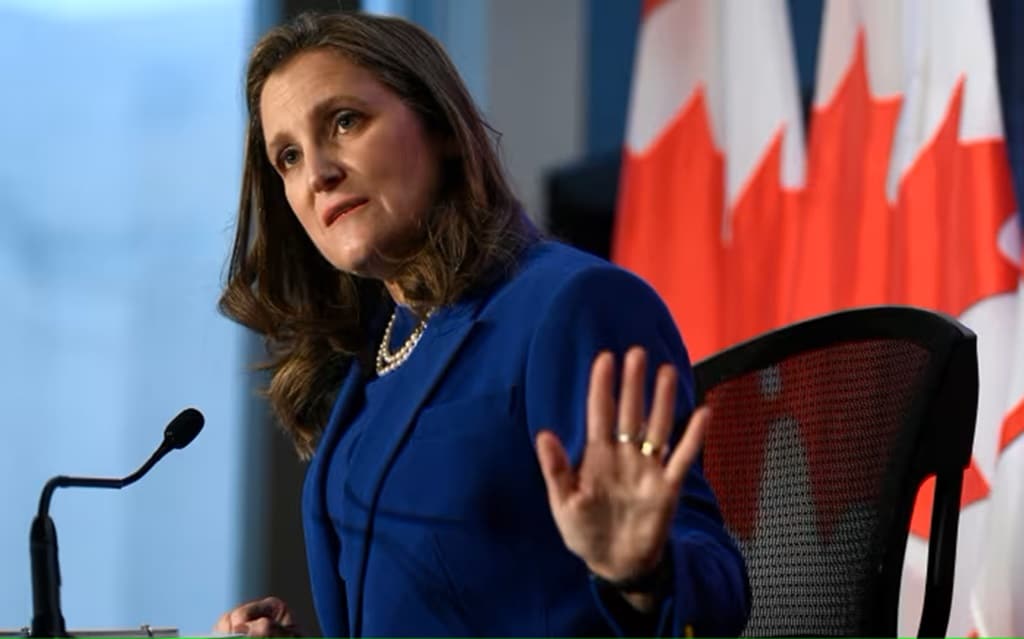Business
Freeland Dodges Media After Omitting Capital Gains Tax Adjustment from 2024 Budget

The Liberal government’s resolution to introduce Budget 2024 in the House earlier today did not include Chrystia Freeland’s proposed capital gains tax adjustments.
These measures, which include raising the capital gains inclusion rate from half to two-thirds, increasing the Lifetime Capital Gains Exemption, and creating a new incentive for entrepreneurs, have sparked strong opposition from the country’s technology elite.
During a news conference today, Finance Minister Chrystia Freeland reiterated the federal government’s support for these policies but declined to answer journalists’ inquiries about why they were not included in today’s motion. It now looks that Freeland intends to seek approval from Parliament through separate legislation.
“We are very committed to the capital gains measures that we put forward in the budget,” said Freeland, who added that “further details and implementing legislation will be forthcoming,” but did not provide a particular date or explain why they were absent from today’s motion.
When asked if she had removed these capital gains tax provisions from this bill to compel the Conservatives to vote on this specific issue, Freeland replied, “No,” and grinned.
The motion contains several of the other measures outlined in Budget 2024. The federal government restated its plans for the new capital gains measures to take effect on June 25, but has yet to provide draft legislation or a detailed technical briefing on these changes.
Capital Gains Tax a Political Football
Ben Bergen, president of the Council of Canadian Innovators, told BetaKit that it is unclear whether implementing capital gains changes through separate legislation is a “political football,” or if it simply indicates that the government has “not done its homework” on what the capital gains changes will mean for the economy.
“[This government] really struggles at some of the most basic elements of execution, and whether or not they’re able to deliver it on the 25th [is a] question mark,” Bergen told CNN. “But given what we’ve seen so far from this government over the last eight years, don’t hold your breath.”
“One simple reason for not including the capital gains tax changes in the budget implementation bill is that the government has not yet written them,” CD Howe Institute CEO William Robson told BetaKit.
“The budget provided only additional details on the rules before the higher rates go into effect on June 25th. “We may not have clarity even then,” Robson warned. “The government might believe this is smart politics. “It’s bad tax policy.”
BetaKit has contacted the Ministry of Finance for comment on why these changes were excluded from today’s motion, when it intends to share the full details of these changes and introduce legislation to support them, and whether such legislation is expected to be implemented by June 25, when the changes are scheduled to take effect.
Canadian tech executives outraged
These capital gains tax adjustments are intended to fund billions of dollars in new expenditure on housing and other priorities while also increasing tax equity between middle-class and wealthy Canadians. Freeland referred to them as the “fiscal foundation” for the government’s other investments.
“Our view is it is absolutely fair to ask those in our country who are at the very top to contribute a little bit more, and that is why we put forward a plan—which we are absolutely committed to—to increasing the capital gains inclusion rate,” Freeland said in a statement.
However, many Canadian tech executives are outraged by them: over 2,000 have signed an open letter urging the federal government to reconsider, claiming that they will hinder tech entrepreneurship and investment while exacerbating Canada’s already-existing productivity difficulties.
In a recent op-ed for The Globe and Mail, Robson stated that the next two months will likely be a “scramble” as the government attempts to issue the rules before June 25. Robson said that the government should “back up the budget’s capital gains tax proposals with rules or abandon them.”
Robson also remarked that the government may not be concerned about completing its deadline. “The June implementation of a higher inclusion rate that is retroactive—affecting past gains, not just those that accrue in the future—matters more to its revenue plans than the permanent changes,” Robson stated in an email.
Bergen noted that putting the capital gains measures to a vote suggests the government is attempting to “line up political parties” by positioning the Conservatives to vote against the reforms. On the other hand, he speculated that given the extensive—but not universal—backlash from Canadian tech executives and others, the government may be aiming to “remove the problem child” from the budget.
Bergen stated that the impact of these measures on businesses, employees, and investors will be highly depending on how the new laws are implemented. “The fact that we have so much ambiguity and chaos in this process is again just another indication of where this government is,” he said.
Canada’s Trans Mountain Pipeline Starts Operations After 12 Years and $25 Billion
Canada’s Trans Mountain Pipeline Starts Operations After 12 Years and $25 Billion





























